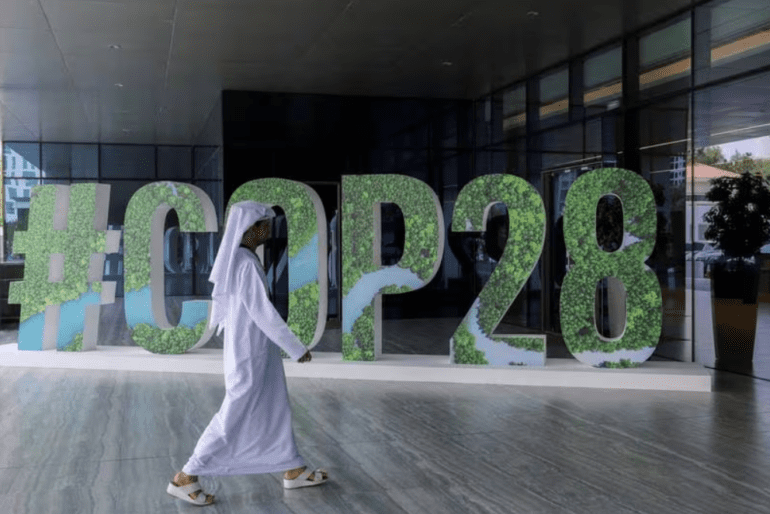TL;DR:
- Jais Climate, a bilingual large language model (LLM), dedicated to climate intelligence, has been launched by the Mohamed Bin Zayed University of Artificial Intelligence in Abu Dhabi.
- Developed in collaboration with Core42, a subsidiary of G42, this LLM focuses on climate, sustainability, and Cop28.
- Jais Climate boasts 1.4 million climate-related instructions and was trained on the ClimaInstruct dataset, making it a valuable resource for climate-related information.
- Large language models like Jais Climate have revolutionized AI by providing rapid access to extensive data and automation of tasks.
- Jais Climate aims to enhance understanding of climate-related issues before and during Cop28, offering quick answers to queries.
- It addresses language bias concerns by being an open-source bilingual Arabic-English model, benefiting millions of Arabic and English speakers globally.
- The model will continually update with Cop28 developments, focusing on science-based climate fact-checking and dispelling misconceptions.
- Experts emphasize the importance of such a climate-centric LLM in advancing climate solutions, especially as the UAE hosts Cop28.
Main AI News:
In a significant stride towards climate intelligence, the Mohamed Bin Zayed University of Artificial Intelligence in Abu Dhabi has introduced a pioneering achievement – Jais Climate, the world’s premier bilingual large language model exclusively dedicated to climate-related matters. This landmark unveiling comes just days prior to the Cop28 conference set to be held in Dubai. Developed in partnership with Core42, a subsidiary of the Abu Dhabi-based technology conglomerate G42, this formidable large language model (LLM) is meticulously tailored to address climate, sustainability, and the impending Cop28 event.
Jais Climate is a monumental leap in climate-focused artificial intelligence, boasting a staggering 1.4 million climate-related instructions in its repertoire. It was meticulously trained on ClimaInstruct, the most extensive instruction-based bilingual dataset pertaining to climate and sustainability topics. This groundbreaking achievement, as confirmed by the Mohamed Bin Zayed University of Artificial Intelligence (MBZUAI) and Core42, signifies a momentous leap in AI technology.
Large language models (LLMs) have ushered in a new era of artificial intelligence, leveraging vast datasets to generate content and expedite tasks at an unprecedented pace. Jais Climate, as an exemplar of this evolution, provides an invaluable resource for gaining insights into climate-related issues in the lead-up to and during Cop28. Andrew Jackson, the Executive Vice President and Chief AI Officer at Core42, emphasizes its significance, stating that even his children have benefited from Jais Climate’s capabilities in their schoolwork. “They’re my base users,” he proudly remarks. “They were able to ask climate questions quickly and get answers back; they truly had a great experience.”
While initial criticisms of LLMs centered on their language bias towards English, Jais Climate addresses these concerns by being an open-source bilingual Arabic-English model. Developed using climate information in both English and Arabic, it bridges language gaps and ensures that climate data is readily accessible to over 274 million Arabic speakers and 1.4 billion English speakers globally, as affirmed by MBZUAI and Core42.
The nomenclature of both LLMs, Jais and Jais Climate, pays homage to the UAE’s highest peak in Ras Al Khaimah. Timothy Baldwin, Associate Provost for Academic Affairs and Professor of Natural Language Processing at MBZUAI, lauds this monumental achievement as a gift to the global community. He affirms that Jais Climate will continuously evolve, providing the latest information, documents, and updates throughout the Cop28 proceedings. Additionally, the model will focus on science-based climate fact-checking and dispelling potential misconceptions.
Eric Xing, President of MBZUAI, underscores the significance of a climate-centric LLM in these transformative times. “We’re empowering millions of people to enhance their understanding of these complex issues,” he states. “This is especially important as the UAE hosts Cop28, shining a spotlight on how advanced technology and scientific research play a pivotal role in shaping future, sustainable solutions.” As Cop28 approaches, Jais Climate stands as a testament to the power of AI in driving climate intelligence and fostering global collaboration in the pursuit of a sustainable future.
Conclusion:
The introduction of Jais Climate represents a significant advancement in AI technology and its applications in the climate and sustainability sectors. This groundbreaking LLM not only bridges language gaps but also empowers individuals and institutions with quick access to accurate climate-related information. It has the potential to shape the future of climate intelligence and scientific research, opening up new opportunities and possibilities in the market for AI-driven climate solutions and sustainable technologies.

